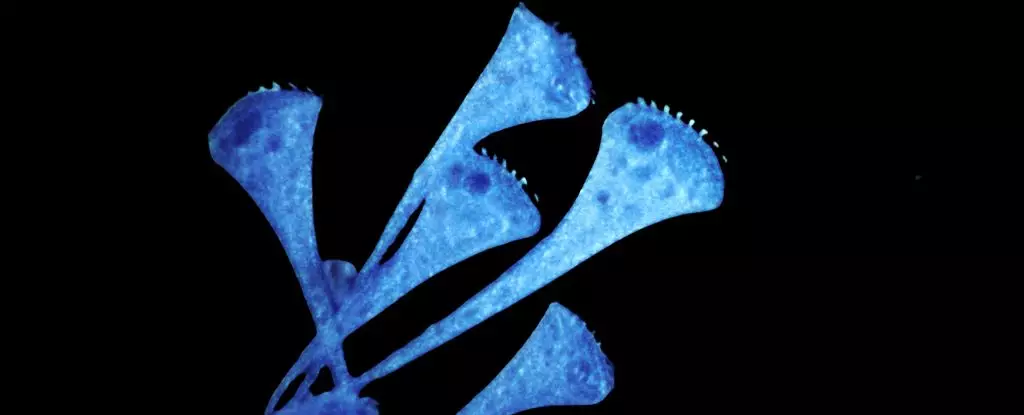

The intricate world of biology continually unveils astonishing insights, shedding light on the remarkable capabilities embedded in even the simplest life forms. Recent research suggests that individual cells—once deemed incapable of intelligence—express a form of learning akin to behaviors seen in organisms with complex nervous systems. This revelation prompts profound questions about the nature of learning and memory, particularly at the cellular level.
The phenomenon of habituation describes a notable psychological process: the dwindling of an organism’s response to a repeated, non-threatening stimulus. For example, consider how both wild animals and humans adapt to familiar sounds or smells, indicating a learned response that lessens over time. Researchers, including biologist Jeremy Gunawardena from Harvard Medical School, are unveiling how even cells devoid of brains can exhibit signs of this learning process. Through rigorous studies, researchers have aimed to understand how non-neural entities respond to stimuli and how these responses can, counterintuitively, manifest elements of memory.
At the forefront of this research are scientists from the Max Planck Institute, led by neurobiologist Lina Eckert, who utilized advanced computer modeling techniques. They examined the molecular networks within mammalian cells along with unicellular organisms known as ciliates. What emerged from their analysis were four distinct molecular networks that exhibited a dual-response mechanism. This unique property allowed for one response to subside much more slowly than the other, thus providing a foundation for habituation.
This duality creates a situation where a short-term, quick reaction diminishes over time in response to a specific stimulus. Remarkably, this slower dissipating response serves as a form of cellular memory, allowing cells to navigate their environment with a learned perspective. “Our findings suggest that cells might be capable of retaining a form of memory that influences both immediate responses and long-term adaptive strategies,” says Rosa Martinez, a biologist from the Centre for Genomic Regulation.
Despite the promising nature of these findings, the research team acknowledges the necessity of confirming these interactions within living cells. Nonetheless, the evidence so far supports the notion that habituation can indeed exist beyond the realm of animals with complex nervous systems. Interestingly, the ciliate Stentor coeruleus has already demonstrated cellular habituation, providing a useful model for further exploration.
The researchers assert that through careful experimentation, it is possible to define priorities and hone in on factors most likely to yield meaningful results. Such a methodological approach not only conserves resources but also opens avenues for potential breakthroughs in understanding complex biological systems.
Should these findings regarding cellular memory hold up under further scrutiny, the implications extend beyond academic curiosity. The understanding of how cells adapt their responses could pave the way for innovative medical advancements, particularly regarding immune system behavior. Gunawardena proposes that by deciphering how immune cells develop “incorrect” perceptions of their environments—such as failing to recognize cancer cells as harmful—there exists potential for re-engineering these responses.
Imagine a scenario where scientists can manipulate immune responses to confront tumors more effectively, acknowledging them as threats rather than benign entities. “While this vision may seem far-fetched currently, it beckons a promising direction for future study,” Gunawardena comments.
The broader implications of this research highlight how our understanding of learning and intelligence is evolving. Historically regarded as a trait exclusive to organisms with complex neural systems, the concept of learning now encounters paradigms that transcend these boundaries. As Eckert and her colleagues assert, the controversy surrounding cellular learning underscores how deeply entrenched ideological beliefs can influence the scientific discourse.
As we delve deeper into the cellular world, the lines separating learning, memory, and intelligence may become increasingly blurred. What once seemed confined to organisms with brains is now emerging in the realms of single cells, inviting a reevaluation of how life itself interacts with its environment. Such discoveries not only enhance our appreciation for the complexity of life but also signal an exciting horizon for biomedical research and beyond.
A groundbreaking discovery by scientists at the University of Manchester is poised to reshape the…
In an era marked by rapid ecological change, the quest for understanding environmental pollutants like…
The meteoric rise of artificial intelligence (AI) technologies is not without significant implications on our…
The landscape of quantum computing is on the verge of transformative progress, fueled by groundbreaking…
Schizophrenia is not merely a mental health issue; it is a multifaceted condition that wreaks…
Recent scientific research has illuminated the intricate web that ties our dietary choices to the…
This website uses cookies.